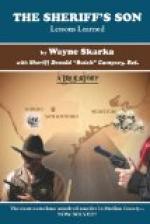Still, the peril had to be faced. He decided to go up the canon in the early morning before the travel of the day had begun. The night before he made the venture he prepared an alibi by telling Mrs. Rothgerber that he would not come to breakfast, as he wanted to get an early start for his canvassing. The little German woman bustled about and wrapped up for him a cold lunch to eat at his cabin in the morning. She liked this quiet, good-looking young man whose smile was warm for a woman almost old enough to be his grandmother. It was not often she met any one with the charming deference he showed her. Somehow he reminded her of her own Hans, who had died from the kick of a horse ten years since.
Roy slept in broken cat-naps full of fearful dreams, from which he woke in terror under the impression that he was struggling helplessly in the net of a great spider which had the cruel, bloodless face of Tighe. It was three o’clock when he rose and began to dress. He slipped out of the cabin into the wet pasture. His legs were sopping wet from the long grass through which he strode to the edge of the gulch. On a flat boulder he sat shivering in the darkness while he waited for the first gray streaks of light to sift into the dun sky.
In the dim dawn he stumbled uncertainly down the trail into the canon, the bottom of which was still black as night from a heavy growth of young aspens that shut out the light. There was a fairly well-worn path leading up the gulch, so that he could grope his way forward slowly. His feet moved reluctantly. It seemed to him that his nerves, his brain, and even his muscles were in revolt against the moral compulsion that drove him on. He could feel his heart beating against his ribs. Every sound startled him. The still darkness took him by the throat. Doggedly he fought against the panic impulse to turn and fly.
If he quit now, he told himself, he could never hold his self-respect. He thought of all those who had come into his life in connection with the Big Creek country trouble. His father, his mother, Dave Dingwell, Pat Ryan, Jess Tighe, the whole Rutherford clan, including Beulah! One quality they all had in common, the gameness to see out to a finish anything they undertook. He could not go through life a confessed coward. The idea was intolerably humiliating.
Then, out of the past, came to him a snatch of nonsense verse:—
“Li’l’ ole hawss an’
li’l’ ole cow,
Amblin’ along by the ole haymow,
Li’l’ ole hawss took a bite
an’ a chew,
‘Durned if I don’t,’
says the ole cow, too.”
So vivid was his impression of the doggerel that for an instant he thought he heard the sing-song of his father’s tuneless voice. In sharp, clean-cut pictures his memory reproduced the night John Beaudry had last chanted the lullaby and that other picture of the Homeric fight of one man against a dozen. The foolish words were a bracer to him. He set his teeth and ploughed forward, still with a quaking soul, but with a kind of despairing resolution.




